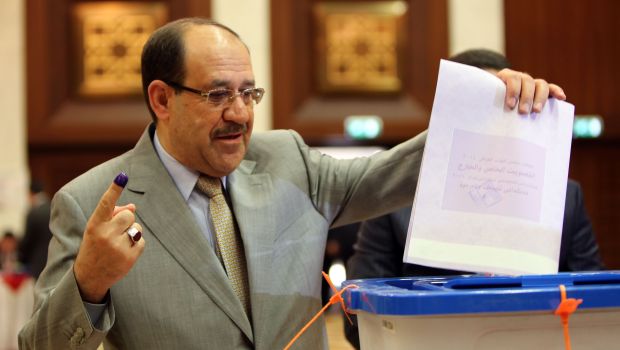
Iraqi Prime Minister Nuri Al-Maliki casting his vote at a polling station in Baghdad’s fortified Green Zone on April 30, 2014. (AFP Photo/Ali Al-Saadi)
Baghdad, Asharq Al-Awsat—Rival Shi’ite political blocs have reiterated their strong opposition to Iraqi Prime Minister Nuri Al-Maliki’s bid for a third term in office, amid claims by each side that they secured the majority required to form a government.
The National Alliance—comprised of the leading Shi’ite forces, the Islamic Supreme Council of Iraq (ISCI), the Sadrist Movement, the National Congress and the Reform Trend—has urged the State of Law coalition to withdraw the nomination of its leader, Nuri Al-Maliki, to head the new government, according to a statement read out by the coalition’s spokesman, Ibrahim Bahr Al-Ulloum, following a meeting by coalition leaders in Baghdad two days ago.
Maliki’s coalition came first in recent parliamentary polls, but failed to win an absolute majority that would enable him to form a government.
The National Alliance said it was ready to cooperate with all “national forces” in running Iraq “without exclusion or marginalization,” emphasizing that the next government should be formed on the basis of political participation “in a way that ensures the peaceful rotation of power.”
“The coalition rejects the political majority option, and believes it would break up the National Alliance and complicate the political crisis further.”
A well-informed source close to one of the National Alliance blocs, who requested anonymity, told Asharq Al-Awsat that there were two reasons behind his bloc’s stance, saying: “First, the State of Law coalition tried to provide incorrect information to some National Alliance leaders, namely that key Sunni blocs and deputies from the Mutahidoun bloc, headed by Osama Al-Nujaifi, the Wataniya bloc led by Iyad Allawi, Al-Arabiya under Saleh Al-Mutlaq, the National Movement for Development and Reform headed by Jamal Al-Karboli, and the Islamic Party under Iyad Al-Samarrai informed the State of Law that they support Maliki’s pursuit of a third premiership.”
“It transpired that this information was incorrect, and it is part of the psychological warfare now being launched by the State of Law coalition to create an impression that the blocs that wish to enter in to an alliance with Hakim and Sadr now hold secret talks with Maliki,” he said, referring to the leaders of the ISCI and the Sadrist Movement, respectively.
The source added that the second reason was that Hakim’s Al-Muwatin bloc had placed some conditions on Maliki if he wanted to serve a third term in office. The bloc demanded five ministerial portfolios, including two sovereign ministries—the Interior Ministry for Baqir Al-Zubeidi and the Finance Ministry for Ahmed Chalabi—according to the source, who said that these conditions were seen by Maliki as “impossible” to meet because he “cannot reason with Zubeidi and Chalabi, both of whom are keen candidates for his post.”
Speaking to Asharq Al-Awsat, Sadiq Al-Labban, a State of Law MP, said his coalition was supported by “blocs and MPs from various groups and from all governorates.”
“What is important to us here is the political platform and the premier’s free will to choose a harmonious government capable of executing the government program within the next four years.”
Labban defended Maliki’s nomination for a third term, saying that the other blocs within the National Alliance are free to choose their own candidates.
With no solution to the current deadlock in sight, a war of numbers has flared up between the political blocs, with Maliki saying he secured the required majority of 165 seats needed to form government after having gained over 175 seats so far, and his political rivals saying that they have 220 seats.
